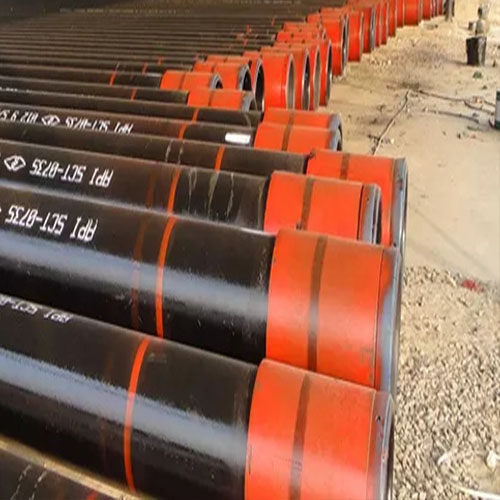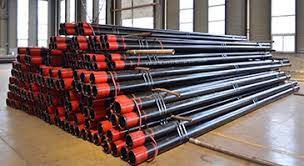Table of Contents
Understanding the Process and Applications of Carbon Steel Welded ERW Pipe API Casing & Tubing
Carbon Steel Welded ERW Pipe API Casing & Tubing is a critical component in the oil and gas industry, playing a pivotal role in the extraction and transportation of hydrocarbons from beneath the earth’s surface. ERW, which stands for Electric Resistance Welding, is a process that uses an electric current to heat the edges of the steel strip, causing them to melt and form a bond. This process results in a high-quality, durable pipe that can withstand the rigors of oil and gas extraction.

The API, or American Petroleum Institute, sets the standards for casing and tubing. These standards ensure that the pipes used in the oil and gas industry are safe, reliable, and efficient. The API casing is a large-diameter pipe that serves as the structural retainer for the walls of oil and gas wells. It prevents the well from collapsing and allows for the drilling of deeper wells. The API tubing, on the other hand, is a smaller-diameter pipe used inside the casing to transport the oil or gas to the surface.
The use of carbon steel in the manufacturing of these pipes is due to its excellent properties. Carbon steel is known for its high strength, durability, and resistance to heat. These properties make it an ideal material for pipes that need to withstand high pressures and temperatures. Moreover, carbon steel is also cost-effective, making it a preferred choice for many industries.
The process of manufacturing Carbon Steel Welded ERW Pipe API Casing & Tubing involves several steps. First, the carbon steel strip is uncoiled and flattened. It is then passed through a series of forming rolls that bend the strip into a cylindrical shape. The edges of the strip are heated using an electric current, causing them to melt and form a bond. This bond is then cooled and solidified to form a strong, durable pipe. The pipe is then cut to the desired length and undergoes a series of tests to ensure its quality and reliability.
The applications of Carbon Steel Welded ERW Pipe API Casing & Tubing are vast and varied. In the oil and gas industry, these pipes are used in drilling operations, where they serve as conduits for the extraction of oil and gas. They are also used in the construction industry, where they are used in the building of bridges, buildings, and other structures. In addition, these pipes are also used in the transportation industry, where they are used in the construction of pipelines for the transportation of oil, gas, and other fluids.
In conclusion, Carbon Steel Welded ERW Pipe API Casing & Tubing is a critical component in many industries, particularly in the oil and gas industry. The use of carbon steel, coupled with the ERW process, results in a high-quality, durable pipe that can withstand high pressures and temperatures. The API standards ensure the Safety and efficiency of these pipes, making them a reliable choice for a variety of applications.
The Role and Importance of Carbon Steel Welded ERW Pipe API Casing & Tubing in the Oil Industry
The oil industry, a cornerstone of the global economy, relies heavily on a vast network of pipelines for the transportation of Crude Oil and Natural Gas. These pipelines, often stretching thousands of miles across continents, are the veins and arteries of the industry, ensuring the smooth flow of these vital resources. At the heart of this intricate system lies the Carbon Steel Welded ERW Pipe API Casing & Tubing, a critical component whose role and importance cannot be overstated.
ERW, or Electric Resistance Welded, refers to a group of welding processes such as spot and seam welding that produce coalescence of faying surfaces where heat to form the weld is generated by the electrical resistance of material combined with the time and the force used to hold the materials together during welding. Carbon Steel Welded ERW Pipe API Casing & Tubing is a specific type of ERW pipe that is designed to withstand the harsh conditions of oil drilling and transportation.
The American Petroleum Institute (API) sets the standards for casing and tubing, which are the main structural components of a well. Casing is the large-diameter pipe that is assembled and inserted into a recently drilled section of a borehole and typically held into place with Cement. Tubing, on the other hand, is a pipe through which the oil or gas is transported from the wellbore. Carbon Steel Welded ERW Pipe API Casing & Tubing is designed to meet these stringent API standards, ensuring the safe and efficient operation of oil wells.
The use of carbon steel in these pipes offers several advantages. Carbon steel is known for its durability and strength, making it ideal for use in the demanding Environment of oil extraction and transportation. It can withstand high pressures and temperatures, and is resistant to the corrosive effects of oil and gas. Furthermore, carbon steel is relatively inexpensive compared to other materials, making it a cost-effective choice for the oil industry.
The welding process used in the production of these pipes also offers several benefits. ERW welding creates a strong, seamless bond that is capable of withstanding the high pressures encountered in oil wells. This seamless construction also reduces the risk of leaks, which can Lead to environmental damage and loss of valuable resources. Moreover, ERW welding allows for the production of pipes in a wide range of diameters and lengths, providing the flexibility needed to meet the diverse needs of the oil industry.

In conclusion, Carbon Steel Welded ERW Pipe API Casing & Tubing plays a pivotal role in the oil industry. Its strength, durability, and cost-effectiveness make it an ideal choice for the demanding conditions of oil extraction and transportation. The ERW welding process ensures a strong, seamless construction that can withstand high pressures and reduce the risk of leaks. As the oil industry continues to evolve and grow, the importance of Carbon Steel Welded ERW Pipe API Casing & Tubing is set to remain paramount, underpinning the safe and efficient operation of this vital sector of the global economy.
